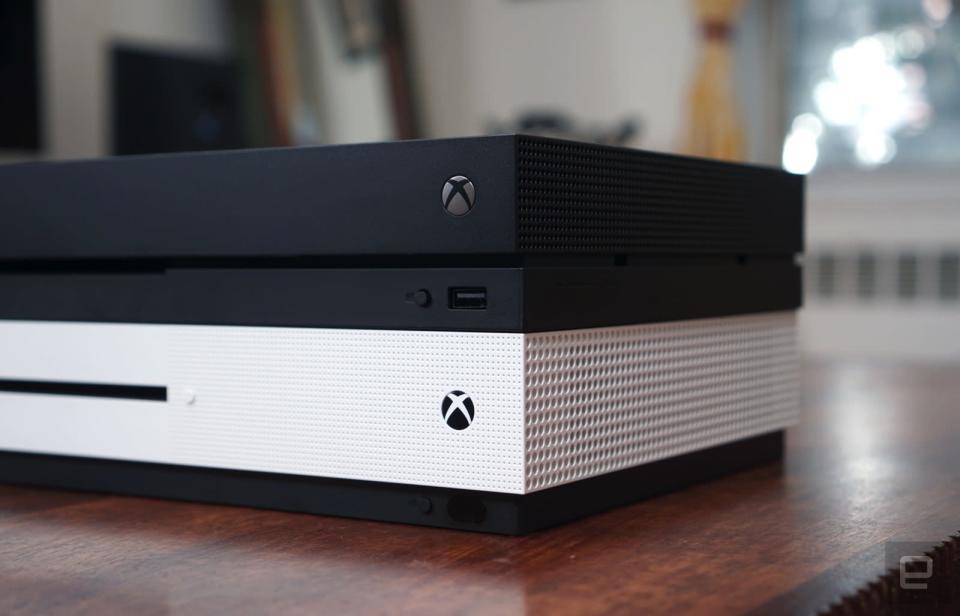Xbox's lack of compelling games won't be fixed next year
Microsoft still has a lot of catching up to do.
Microsoft's 2017 started six months early. At E3 2016, Xbox chief Phil Spencer closed out the company's keynote by teasing the "most powerful console ever." At this year's show, he finally revealed the Xbox One X, and in November, the hardware was at retail. In the time it takes to earn a bachelor's degree, Microsoft addressed one of the internet's loudest complaints about the Xbox One: that it wasn't powerful enough compared to the PlayStation 4.
A 6-teraflop GPU and 12GB of RAM won't help Microsoft clear its other hurdle, though, at least not in the short term. Since last year, the company has shuttered a pair of its internal development studios (Fable house Lionhead and Max and the Curse of Brotherhood's Press Play) and killed off at least two other games: the incredibly promising dragon-owning-simulator Scalebound from PlatinumGames and the internally developed game-creation suite Project Spark.
The number of internal studios and software projects is so low that the company had to announce it would be going on a shopping spree for new studios and games next year. The problem is, on average, games take between two and three years to make, and big AAA tentpoles can easily spend double that time in development. Xbox's dearth of fresh games you can't play anywhere else isn't going to be fixed in 2018.

This fall, the Xbox's big exclusives were racing sim Forza Motorsport 7, which, while extremely pretty, was more of the same, and PlayerUnknown's Battlegrounds. The latter has 25 million players on PC, and Microsoft is bragging it racked up over 1 million players in its first 48 hours on Xbox One. The lovably clunky work in progress isn't the type of thing that's going to hit beyond Microsoft's shooter-centric base, however. At the moment it also isn't the type of game you boot up to show off your fancy new console and TV. The same goes for backwards compatibility with 15-year-old games from the original Xbox.
So how does Microsoft fill the gap between now and whenever its first new purchase comes out? Early 2018 has the cartoony shared-world pirate simulator Sea of Thieves and Crackdown 3, both of which are big maybes. Let me explain. Thieves is developer Rare's first stab at making a Destiny-like persistent online world. It'd be a feat for any team to make, but aside from the nostalgic Rare Replay collection from 2015, Rare hasn't had a critical hit in almost a decade.
Crackdown 3 has been delayed multiple times, and based on what I played of it at E3 this year, its being pushed into 2018 wasn't surprising at all. Will it actually be good when the ambiguous "spring" launch window rolls around? I wish I could say yes with any degree of certainty, but that isn't the case. State of Decay 2 is supposedly getting a big push from Microsoft, but zombie-survival games aren't the type of thing that cross over to mainstream success. That brings us back to Microsoft's well-tread path of racing games and first-person shooters.

You can all but guarantee we'll have Forza Horizon 4 next fall. And the team at 343 Industries has been quiet for a while, so you can probably expect news of Halo 6 to arrive next year as well. But considering how the last game turned out, you might want to hedge your bets as to how it'll play and what to expect out of it.
But what about all the exclusives Microsoft debuted at E3 in 2017? Many of them were "console launch exclusives," meaning that they'll show up other places. For example, Metro: Exodus will also be available on PC and will almost assuredly make its way to PS4. As for indies, The Artful Escape won't be out until "it's damn ready." Ashen looks promising, but two years later and it doesn't have a release date. Same goes for Ori and the Will of the Wisp.
The team at Insomniac didn't get an order for 'Sunset Overdrive 2' unless you count their PS4 exclusive 'Spider-Man' game out next spring.
There haven't been any sequels announced for any of Microsoft's AAA exclusives from the past four years that aren't named Forza, Gears of War or Halo either. Remedy is working on multiplatform games now, not a sequel to Quantum Break or Alan Wake. The team at Insomniac didn't get an order for Sunset Overdrive 2 unless you count its PS4 exclusive Spider-Man game out next spring. The perpetually beleaguered Crytek has been focusing on virtual reality and free-to-play games, and its relationship with Microsoft reportedly soured over a sequel to Xbox One launch title Ryse: Son of Rome.
Spencer has gone on the record saying that third-party exclusives like 2015's Rise of the Tomb Raider aren't viable for any games platform in the long run. But two years later, that's basically what Microsoft has. The company spent a year and a half trying to convince people they needed an Xbox One X with system specs alone. In the face of Nintendo's runaway success with the Switch and Sony's burgeoning lineup of diverse games you can't play anywhere else, 2018 has to be the year Microsoft starts convincing people there's a reason to buy any Xbox -- not just the most powerful one ever.











